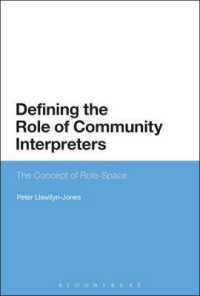- ホーム
- > 洋書
- > 英文書
- > Business / Economics
基本説明
This book shows how discussion on "chance," "risk," "gambling," "insurance," and "speculation" illuminates where societies stood.
Full Description
Although financial markets often try to distance themselves from gambling, the two factors have far more in common than usually thought. When, historically, there were no financial institutions such as banks, lotteries constituted the ways by which expensive items were disposed of, and governments raised money quickly. Gambling tables fulfilled roles that venture capital and banking do today. 'Gamblers' created clearinghouses and sustained liquidity. When those gamblers bet on price distributions in futures markets, they were redefined as 'speculators'. Today they are called 'hedge fund managers' or 'bankers'. Though the names have changed, the actions undertaken have essentially stayed the same. This book shows how discussion on 'chance', 'risk', 'gambling', 'insurance', and 'speculation' illuminates where societies stood, where we are today, and where we may be heading.
Contents
1. From religion to risk management - what do you do when facing uncertainty?; 2. Anything wrong with gambling as a pastime?; 3. Are you rich? Risk-taking, gambling, and the leapfrogging instinct; 4. Betting on futures; 5. Gambling - as banking: poker, junk bonds and central banks; 6. 'Lottery is a taxation, and Heav'n be prais'd, it is easily rais'd'; 7. Politics and prohibitions, or, what's a good tax anyway?; 8. How gamblers and risk-takers correct the future; Appendix 1. Gambling and risk-taking: the leapfrogging instinct; Appendix 2. Human nature and the 'civilizing' process; Appendix 3. A statistical profile of gamblers.







